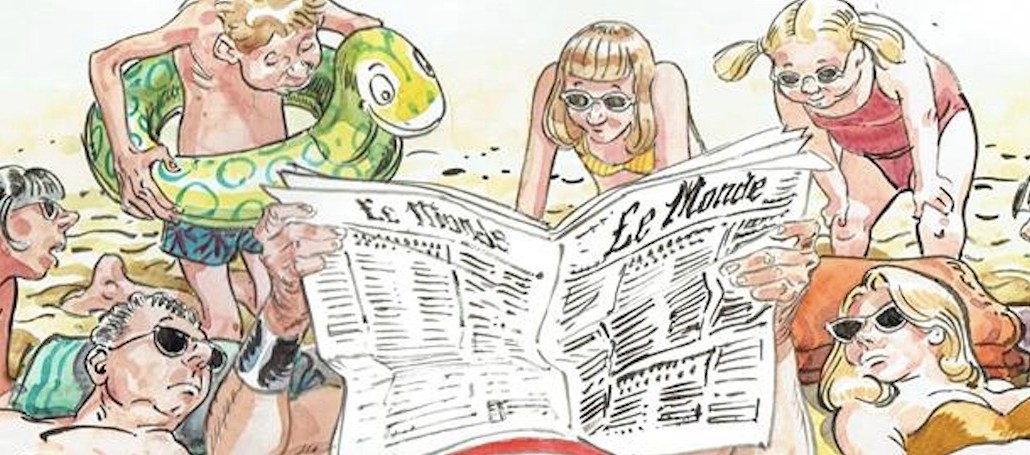Secure your place at the Digiday Media Buying Summit in Nashville, March 2-4

Le Monde is set to release a suite of products designed to throttle the spread of fake news online.
“Decodex” is the name for the French newspaper’s three fact-checking products powered by a database of 600 websites deemed unreliable and compiled by Le Monde’s fact-checking unit, Les Décodeurs, over the last year.
The websites included in the database are mainly French, but there are a number of international sites too, including the controversial, so-called “alt-right” site Breitbart, which has been attempting to expand in France and Germany. Other examples of sites included in the database include U.S. sites “Daily News Bin” and “Denver Guardian,” along with French false-news sites and ones that regularly publish conspiracy theories, such as “Dernières Nouvelles du Dragon” (“The Latest Dragon News”).
Fake news tends to fall into three buckets: entirely fictional stories, articles that include a kernel of truth wrapped up in lies, and partisan-driven stories — all of which can spread like wildfire on social platforms. Le Monde’s database includes sites that aren’t just false sites but ones which manipulate truths by aggregating extremist stories from other sources in single places on their sites.

The database also includes some satirical sites if they are deemed irresponsible with their labeling or in the kind of content and sentiment they are projecting. “We don’t want to make this political at all,” said Samuel Laurent, head of Les Décodeurs. “You can be far right if you want as long as you respect the facts and don’t seek to manipulate them.”
The lines can get blurry, though. François Desouche, a big, legitimate French site, has aggregated stories from other media outlets that distort news about Muslims or immigrants, according to Laurent.
Other sites may “seem normal” but are dispelling misinformation on areas like abortion. “You then find out they’re run by Catholic militants,” so are heavily partisan, added Laurent.
The database will live on Le Monde’s sites where people can type a URL or name of a site to check whether it is a verified news source.

Laurent’s team has also built downloadable Chrome and Firefox extensions that will then alert readers to what stories are totally false, unverified or true with a color-coded red, yellow and green system. Messages will pop up next to stories that are deemed unreliable or that have come from any of the 600 websites in the Decodex database.
To coincide with the site launch, set for the first week of February, Le Monde will also launch its first Facebook Messenger bot dedicated entirely to checking facts. Le Monde has so far resisted the pull of chatbots, having been skeptical of their value and longevity for news distribution, according to Laurent. But with Facebook a place where false articles and images often go viral, launching a bot there makes sense and will be easily accessible to the publisher’s 3.5 million Facebook followers.
People will be able to type specific website URLs into the bot if they want to verify it, or they can type in brand names, keywords and whatever is in the Decodex database will be surfaced. “We don’t want to make the bot too sophisticated, or it will seem deceptive,” added Laurent.

The publisher will run an ad campaign to promote the new features and tools, which have all been developed open source so other publishers can access the database. Readers will also be able to ask the Les Décodeurs team via the bot whether a story is a conspiracy theory or not.
“Being open source is important,” said Laurent. “This is not a fight between us and other media. This is something we’re doing for democracy, because we are very worried. The goal is to share the tools.”
The project, which has been a year in development, will continue to iterate throughout 2017. “We can’t force people to download the extensions, and we know we won’t solve the problem by ourselves,” said Laurent. “But this is a way we can say to the likes of Facebook and Twitter that it is possible to check the sources. Stop saying you can’t.”
More in Media

Media Briefing: Turning scraped content into paid assets — Amazon and Microsoft build AI marketplaces
Amazon plans an AI content marketplace to join Microsoft’s efforts and pay publishers — but it relies on AI com stop scraping for free.

Overheard at the Digiday AI Marketing Strategies event
Marketers, brands, and tech companies chat in-person at Digiday’s AI Marketing Strategies event about internal friction, how best to use AI tools, and more.

Digiday+ Research: Dow Jones, Business Insider and other publishers on AI-driven search
This report explores how publishers are navigating search as AI reshapes how people access information and how publishers monetize content.





